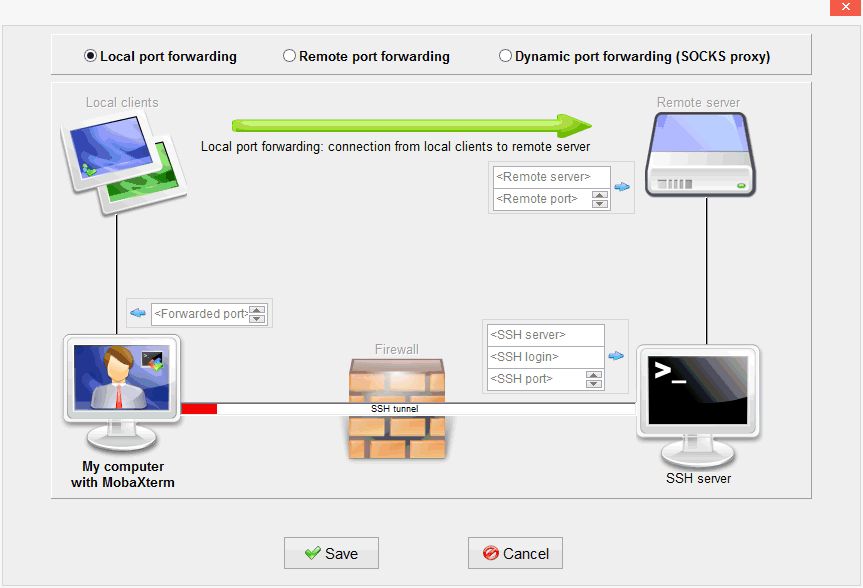
- SSH TUNNEL MANAGER WINDOWS HOW TO
- SSH TUNNEL MANAGER WINDOWS INSTALL
- SSH TUNNEL MANAGER WINDOWS PASSWORD
- SSH TUNNEL MANAGER WINDOWS LICENSE
- SSH TUNNEL MANAGER WINDOWS DOWNLOAD
Username: Enter the username for your remote server SSH account.Stay on the Login tab, but now you have to fill out the Authentication section to the right.Leave the obfuscation items unchecked/empty.Typically, SSH listens on port 22, so if you are unsure what port to specify, try that. Port: Enter the SSH port for this Host.Host: Enter the FQDN host or SSH service IP address for the remote server you want to route traffic through.The first things that you need to configure are in the Login tab in the Server section. When you launch Bitvise SSH client, it will bring up a window to let you configure a connection.
SSH TUNNEL MANAGER WINDOWS DOWNLOAD
Run the installer after you download it and follow the directions.īitvise SSH Client is free, but if you like this product, you should consider purchasing their SSH server product if you have a need for it. If you haven't installed the Bitvise SSH Client yet, you can download a copy from here: In order to make an SSH tunnel, choose the program you have elected to use from the tabs below and follow the directions.

In order to set up an SSH tunnel between a Windows machine and a remote server, you need a few things: This article will explain how you can set up an SSH tunnel from your local Windows machine. This can be useful to bypass remote network issues or restrictive firewalls. With a tunnel active and traffic proxied through the tunnel, that traffic will appear to be coming from your remote server instead of your local machine. All of this rerouted traffic is securely encrypted as it travels between your local machine and the remote server thanks to SSH. For some uses, there may be an easier way to securely route your traffic through a remote server (like your VPS or dedicated server).Īn SSH tunnel is another method of rerouting some or all traffic from one location (like your local computer) through another (your remote server). The issue is that setting up and configuring a VPN can be time consuming and complicated. If you have a VPS or dedicated server, you could even run a VPN service from your server.
SSH TUNNEL MANAGER WINDOWS LICENSE
Note: Every time you wish to use Matlab on your PC, this SSH tunnel has to established with the Matlab License Servers prior to the application being launched.VPNs are powerful tools and can help keep your network traffic secure.
SSH TUNNEL MANAGER WINDOWS INSTALL
Repeat steps 3 and 4 to forward additional ports.īefore beginning the procedure below you will need to install an SSH client such as PuTTy Saved Sessions: SSH Tunnel to remote_host1.Under "Basic options for your PuTTy session" enter:.In the Category pane of the PuTTY Configuration window, click on Session.Under "Options controlling SSH port forwarding" enter the following:.In the Category pane of the PuTTY Configuration window, expand Connection then expand SSH and select Tunnels.Where: 4040 is the local or Source port remote_ is the remote hostname and 5050 is the remote port In this example we will use PuTTy to create an SSH tunnel to the following remote hosts.

Otherwise, in the absence of those options, an interactive session was established in addition to the port forwardings in that case, you must leave that interactive session active until you're finished using the tunnel, as exiting the interactive session will also tear down the tunnel.
SSH TUNNEL MANAGER WINDOWS HOW TO
If you used the "-N" and "-f" options above, remember to kill your ssh tunnel once you're finished using it (see the "ps" and "kill" manpages for information on how to find and kill your ssh tunnel process).
SSH TUNNEL MANAGER WINDOWS PASSWORD


 0 kommentar(er)
0 kommentar(er)
